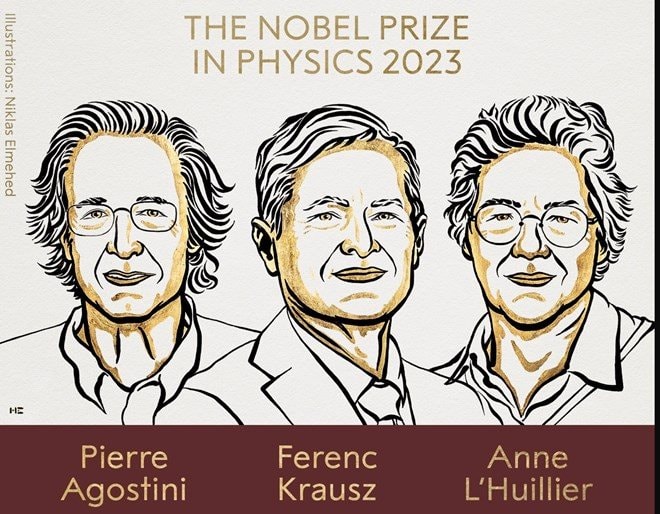Activities
ICP News
Date: 10-10-2023

The 2023 Nobel Prize in Physics
The 2023 Nobel Prize in Physics honors three scientists for their pioneering work that has provided humanity with new tools to explore the world of electrons inside atoms and molecules.
On the afternoon of October 3, 2023, the Royal Swedish Academy of Sciences announced that the Nobel Prize in Physics 2023 had been awarded to Pierre Agostini (France), Ferenc Krausz (Austria, of Hungarian origin), and Anne L’Huillier (Sweden, of French origin) for their experimental methods of generating attosecond pulses of light for studying electron dynamics in matter. These three laureates were recognized for their experiments that have given humanity new tools to explore the world of electrons inside atoms and molecules. Agostini, Krausz, and L’Huillier demonstrated a way to generate ultra-short pulses of light that can be used to measure rapid processes in which electrons move or change energy.

Fast-moving events blur together when perceived by humans—much like how a movie appears to show continuous motion, even though it consists of still frames. To investigate extremely brief events, special technology is required. In the electron world, changes occur within fractions of an attosecond—an attosecond is so short that as many fit into one second as the number of seconds that have passed since the birth of the universe. The experiments of the 2023 Nobel laureates in Physics generated light pulses so short they are measured in attoseconds, thereby showing that these pulses can be used to capture processes occurring inside atoms and molecules. These breakthroughs have enabled the study of processes that were previously impossible to observe.
"Now we can open the door to the world of electrons. Attosecond physics gives us the opportunity to understand mechanisms governed by electrons. The next step will be to utilize them,"
said Eva Olsson, Chair of the Nobel Committee for Physics.
There are potential applications across many fields. For example, in electronics, it is essential to understand and control how electrons behave in materials. Attosecond pulses can also be used to identify different molecules, which could be useful in medical diagnostics.
This was the second prize to be announced in the 2023 Nobel season, following the announcement of the Nobel Prize in Physiology or Medicine. On October 2, 2023, in Stockholm, the Nobel Assembly at the Karolinska Institute awarded the Nobel Prize in Physiology or Medicine 2023 to Hungarian scientist Katalin Karikó and American scientist Drew Weissman for their discoveries concerning nucleoside base modifications that enabled the development of effective mRNA vaccines against COVID-19.
Source: https://www.nobelprize.org/prizes/physics/2023/press-release/
There are potential applications across many fields. For example, in electronics, it is essential to understand and control how electrons behave in materials. Attosecond pulses can also be used to identify different molecules, which could be useful in medical diagnostics.
This was the second prize to be announced in the 2023 Nobel season, following the announcement of the Nobel Prize in Physiology or Medicine. On October 2, 2023, in Stockholm, the Nobel Assembly at the Karolinska Institute awarded the Nobel Prize in Physiology or Medicine 2023 to Hungarian scientist Katalin Karikó and American scientist Drew Weissman for their discoveries concerning nucleoside base modifications that enabled the development of effective mRNA vaccines against COVID-19.
Source: https://www.nobelprize.org/prizes/physics/2023/press-release/
